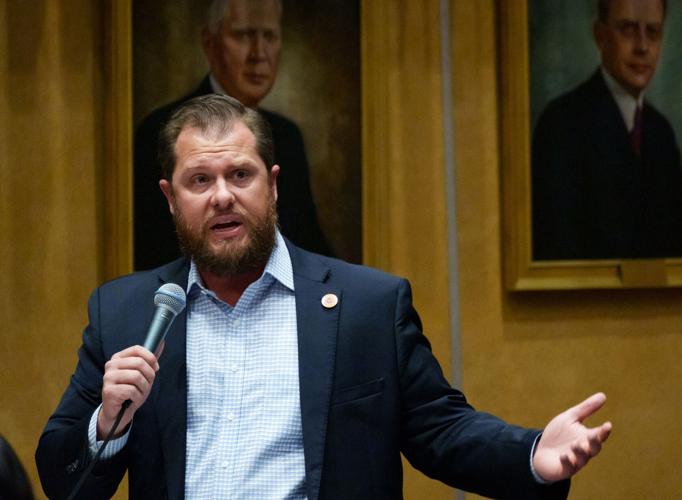PHOENIX — Accusing GOP senators of “partisan obstructionism,’’ Gov. Katie Hobbs announced Monday she won’t seek confirmation of any of her nominees to head state agencies who haven’t already been through the process.
But she is doing it in a way to ensure that those she chooses continue to serve: She is naming each of them as “executive deputy directors’’ of their respective agencies, positions that do not require Senate confirmation.
In a letter to Senate President Warren Petersen, the Democratic governor accused Republican Sen. Jake Hoffman, who chairs the Committee on Director Nominations, of being not just “disrespectful’’ to her choices but trying to “leverage the confirmation of qualified nominees for the implementation of his policy preferences within the executive branch.’’
“He has contacted nominees to imply that their confirmation hinged on the rescission of long-standing agency policies over which he has no authority,’’ Hobbs told Petersen. “He has held up the confirmation of a nomination simply for identifying as pro-choice.’’
Withdrawing the nominees from consideration, Hobbs said, will ensure that “state government can continue to function for Arizona.’’
The net effect is that each agency will function without a director, said the governor’s press aide, Christian Slater.
That is not unusual on a short-term basis, as deputy directors often fill in when someone quits or is fired.
But this would mark the first time, on a wholesale basis, that 13 agencies will be functioning that way.
‘This isn’t a dictatorship’
The move will get a legal fight.
“There is no getting around the process,’’ Petersen, a Gilbert Republican, told Capitol Media Services.
“We have a system of checks and balances,’’ he said. “This isn’t a dictatorship.”
Petersen said the rejections of several appointees was justified, saying that list included “several people who were either incompetent or overly partisan.’’ He did not spell out which ones he’s claiming fell into either category.
He said Hobbs’ maneuver is little more than a political charade.
“It doesn’t matter what she calls someone,’’ he said. “If they are the actual director, they must be confirmed.’’
Petersen said anyone who is running the agency, regardless of title, has to be confirmed by the Senate.
There is a provision that allows director nominees to serve up to a year if they have not been confirmed. Petersen said as far as he is concerned, if a person running a department has not been through the process and been approved by the Senate, they lose their jobs.
There appears to be no authority for the Legislature to fire an employee of the executive department. Even if there were, any legislative action would be subject to veto by the governor.
But Petersen said he is relying on a section of law that says for certain offices, “the governor shall nominate and with the consent of the Senate appoint such officer as prescribed.’’
He also said the laws establishing each agency require they be headed by a director appointed by the governor. Those laws say it is the director who administers the department and determines compensation.
Petersen particularly cited a law dealing with the Arizona Department of Housing. On Sept. 14, Hoffman’s panel rejected Hobbs’ choice of Joan Serviss to head the agency amid claims she had plagiarized, which Serviss disputed. That statute spells it is the job of the director to appoint a deputy director.
Hobbs may have outmaneuvered foes
It appears, though, that Hobbs may have anticipated that and outmaneuvered the Senate. The key is timing.
Slater said that once she withdrew each nomination, each agency had no director. That allowed her to appoint an “interim director’’ who, in turn, was empowered to name a deputy.
Then, after completing that chore, he said, each agency’s interim director promptly quit, often having served no more than five minutes.
And Hobbs has her own list of legal provisions Slater said back her actions.
“There’s no statute that limits the time a deputy director can serve,’’ he said. Another law says each agency deputy director “possesses the powers and may perform the duties prescribed by law for the office of the principal.’’
Hoffman accused Hobbs of throwing “petulant temper tantrums when she doesn’t get her way.’’ He defended the panel’s decisions to reject the nominees it did, saying it’s part of the Senate’s role under the constitutional system of checks and balances.
It hasn’t always been that way.
For example, under the old system, the choice by Hobbs of Jennifer Toth to head the Arizona Department of Transportation would have gone to the Senate Transportation and Technology Committee instead of to Hoffman’s panel, which rejected her. Sen. Lela Alston, D-Phoenix, said the Transportation committee members might have background in transit issues.
What changed is this is the first time in 15 yeas the Republican-controlled Legislature has had to deal with a Democratic governor and her nominees. So Petersen this year created the Committee on Director Nominations to handle all appointments and appoint Hoffman, a Queen Creek Republican and head of the conservative Arizona Freedom Caucus, as its chair.
Others rejected by the new committee included nominees for health director and for registrar of contractors.
Nominees grilled on personal feelings
Hoffman has grilled nominees on their personal feelings about issues.
In Toth’s case, he asked what she thought whether racism plays a role in road construction decisions and whether toxic masculinity is a factor in accidents.

Sen. Jake Hoffman
Toth, who was director of the Maricopa County Transportation Department, responded it is her job to adopt the policies set out by the governor and the Legislature. Her feelings aren’t relevant, she said.
“This committee is here to evaluate you,’’ Hoffman shot back. “And I feel that it’s relevant, which is why I’m asking the questions.’’
Others haven’t even gotten a hearing, including Karen Peters, a deputy Phoenix city manager nominated by Hobbs to head the Arizona Department of Environmental Quality. Hoffman said at the time there was “concerning information’’ about her but did not specify.
For the moment, Peters is getting the last word.
In a memo Monday to ADEQ staff, she announced her new position as executive deputy director “not subject to Senate confirmation.’’ In that role, Peters said she will serve in Hobbs’ cabinet, just as if she were actually the director.
With the governor’s action, the next move is up to Petersen, as Slater said Hobbs has no intention of seeking a court order over her powers. The Senate president said he has no such hesitation, though.
“This one’s black and white,’’ he said of his reading of the governor’s powers. “No question on the legal outcome.’’
Hoffman agreed. “The law is on our side,’’ he said.
It could end without a court fight, however. In her letter to Petersen, Hobbs said she will resume sending nominations to the Senate if it resumes “confirming nominees as contemplated by law.’’
Get your morning recap of today's local news and read the full stories here: tucne.ws/morning.






